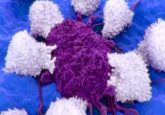Immunotherapy for breast cancer: is it feasible?
Immunotherapy invited leading experts in the field to share their thoughts on two key immunotherapeutic strategies in the field of breast cancer research, vaccines and checkpoint inhibitors.
Interviewed by Ellen Clarke (Commissioning Editor, Future Science Group).
Historically breast cancer has been considered immunologically silent. Patients have had limited access to the types of immunotherapy available to melanoma and lung cancer patients, but this could all be set to change as recent preclinical and clinical studies have highlighted the potential of immunotherapy for breast cancer. Breast cancer is now one of the major cancer types for which new immune-based treatments are being developed.
Leisha A Emens: Department of Oncology, Johns Hopkins University School of Medicine, Kimmel Cancer Center at Johns Hopkins
Q Currently what are the treatment options available to breast cancer patients?
Invasive breast cancer is managed in a multidisciplinary fashion using a combination of surgery, radiation therapy and systemic therapy. Systemic therapies include endocrine therapy, chemotherapy, monoclonal antibody therapy (trastuzumab, perutuzmab, trastuzumab-emtansine (TD-M1) and small molecularly targeted therapies (lapatinib, everolimus and palbociclib). For early stage invasive breast cancer, the goal of therapy is cure. Surgery and radiation therapy are used for local control, where surgical excision removes the bulk of the tumor and radiation is given to treat local microscopic disease that could be left behind. For early stage invasive breast cancer, systemic therapy is used to eradicate disseminated micro-metastatic disease that could ultimately result in relapse and incurable disease.
Click here to read the full article in Immunotherapy.




